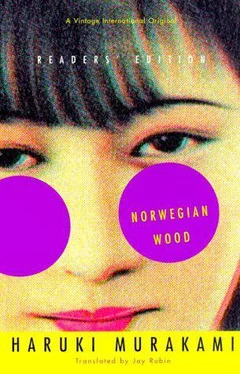In the ten months between Kizuki's death and my exams, I was unable to find a place for myself in the world around me. I started sleeping with one of the girls at school, but that didn't last six months. Nothing about her really got to me. I applied to a private university in Tokyo, the kind of place with an entrance exam for which I wouldn't have to study much, and I passed without exhilaration. The girl asked me not to go to Tokyo - "It's 500 miles from here!" she pleaded - but I had to get away from Kobe at any cost. I wanted to begin a new life where I didn't know a soul.
"You don't give a damn about me any more, now that you've slept with me," she said, crying.
"That's not true," I insisted. "I just need to get away from this town."
But she was not prepared to understand me. And so we parted.
Thinking about all the things that made her so much nicer than the other girls at home, I sat on the bullet train to Tokyo feeling terrible about what I'd done, but there was no way to undo it. I would try to forget her.
There was only one thing for me to do when I started my new life in the dorm: stop taking everything so seriously; establish a proper distance between myself and everything else. Forget about green baize pool tables and red N-360s and white flowers on school desks; about smoke rising from tall crematorium chimneys, and chunky paperweights in police interrogation rooms. It seemed to work at first.
I tried hard to forget, but there remained inside me a vague knot of air.
And as time went by, the knot began to take on a clear and simple form, a form that I am able to put into words, like this: Death exists, not as the opposite but as a part of life.
It's a cliché translated into words, but at the time I felt it not as words but as that knot of air inside me. Death exists - in a paperweight, in four red and white balls on a pool table - and we go on living and breathing it into our lungs like fine dust.
Until that time, I had understood death as something entirely separate from and independent of life. The hand of death is bound to take us, I had felt, but until the day it reaches out for us, it leaves us alone. This had seemed to me the simple, logical truth. Life is here, death is over there. I am here, not over there.
The night Kizuki died, however, I lost the ability to see death (and life) in such simple terms. Death was not the opposite of life. It was already here, within my being, it had always been here, and no struggle would permit me to forget that.
When it took the 17-year-old Kizuki that night in May, death took me as well.
I lived through the following spring, at 18, with that knot of air in my chest, but I struggled all the while against becoming serious.
Becoming serious was not the same thing as approaching the truth, I sensed, however vaguely. But death was a fact, a serious fact, no matter how you looked at it. Stuck inside this suffocating contradiction, I went on endlessly spinning in circles. Those were strange days, now that I look back at them. In the midst of life, everything revolved around death.
Naoko called me the following Saturday, and that Sunday we had a date. I suppose I can call it a date. I can't think of a better word for it.
As before, we walked the streets. We stopped somewhere for coffee, walked some more, had dinner in the evening, and said goodbye. Again, she talked only in snatches, but this didn't seem to bother her, and I made no special effort to keep the conversation going. We talked about whatever came to mind - our daily routines, our colleges; each a little fragment that led nowhere. We said nothing at all about the past. And mainly, we walked - and walked, and walked. Fortunately, Tokyo is such a big city we could never have covered it all.
We kept on walking like this almost every weekend. She would lead, and I would follow close behind. Naoko had a variety of hairslides and always wore them with her right ear exposed. I remember her most clearly this way, from the back. She would toy with her hairslide whenever she felt embarrassed by something. And she was always dabbing at her mouth with a handkerchief. She did this whenever she had something to say. The more I observed these habits of hers, the more I came to like her.
Naoko went to a girls' college on the rural western edge of Tokyo, a nice little place famous for its teaching of English.
Nearby was a narrow irrigation canal with clean, clear water, and Naoko and I would often walk along its banks. Sometimes she would invite me up to her flat and cook for me. It never seemed to concern her that the two of us were in such close quarters together. The room was small and neat and so lacking in frills that only the stockings drying in the corner by the window gave any hint that a girl lived there. She led a spare, simple life with hardly any friends. No one who had known her at school could have imagined her like this. Back then, she had dressed with real flair and surrounded herself with a million friends. When I saw her room, I realized that, like me, she had wanted to go away to college and begin a new life far from anyone she knew.
"Know why I chose this place?" she said with a smile. "Because nobody from home was coming here. We were all supposed to go somewhere more chic. You know what I mean?"
My relationship with Naoko was not without its progress, though.
Little by little, she grew more accustomed to me, and I to her. When the summer holidays ended and a new term started, Naoko began walking next to me as if it were the most natural thing in the world to do. She saw me as a friend now, I concluded, and walking side by side with such a beautiful girl was by no means painful for me. We kept walking all over Tokyo in the same meandering way, climbing hills, crossing rivers and railway lines, just walking and walking with no destination in mind. We forged straight ahead, as if our walking were a religious ritual meant to heal our wounded spirits. If it rained, we used umbrellas, but in any case we walked.
Then came autumn, and the dormitory grounds were buried in zelkova leaves. The fragrance of a new season arrived when I put on my first pullover. Having worn out one pair of shoes, I bought some new suede ones.
I can't seem to recall what we talked about then. Nothing special, I expect. We continued to avoid any mention of the past and rarely spoke about Kizuki. We could face each other over coffee cups in total silence.
Naoko liked to hear me tell stories about Storm Trooper. Once he had a date with a fellow student (a girl in geography, of course) but came back in the early evening looking glum. "Tell me, W W -Watanabe, what do you talk about with g -g-girls?" I don't remember how I answered him, but he had picked the wrong person to ask. In July, somebody in the dorm had taken down Storm Trooper's Amsterdam canal scene and put up a photo of the Golden Gate Bridge instead. He told me he wanted to know if Storm Trooper could masturbate to the Golden Gate Bridge. "He loved it," I reported later, which prompted someone else to put up a picture of an iceberg. Each time the photo changed in his absence, Storm Trooper became upset.
"Who-who-who the hell is doing this?" he asked.
"I wonder," I said. "But what's the difference? They're all nice pictures. You should be grateful."
"Yeah, I s'pose so, but it's weird."
My stories of Storm Trooper always made Naoko laugh. Not many things succeeded in doing that, so I talked about him often, though I was not exactly proud of myself for using him this way. He just happened to be the youngest son in a not-too-wealthy family who had grown up a little too serious for his own good. Making maps was the one small dream of his one small life. Who had the right to make fun of him for that?
By then, however, Storm-Trooper jokes had become an indispensable source of dormitory talk, and there was no way for me to undo what I had done. Besides, the sight of Naoko's smiling face had become my own special source of pleasure. I went on supplying everyone with new stories.
Читать дальше












